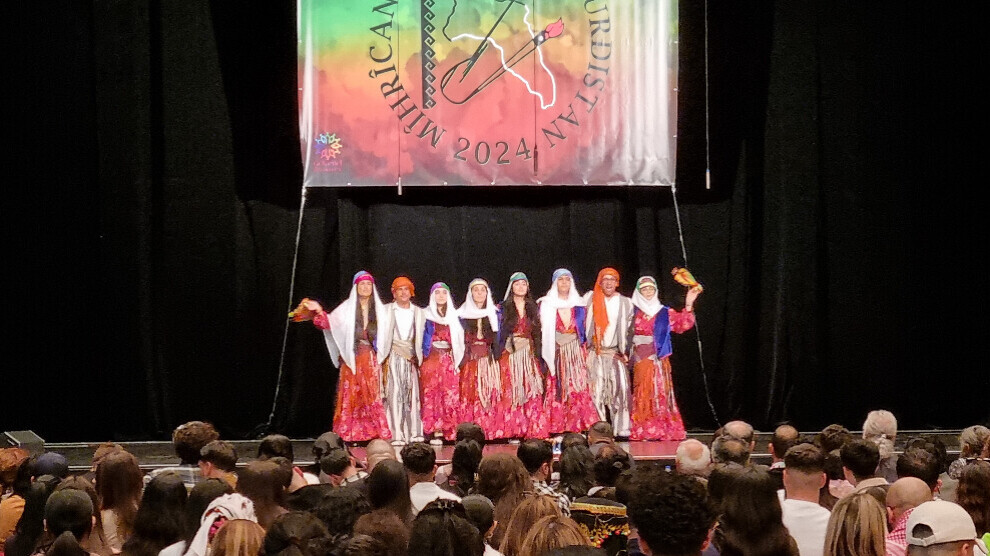Women prime at 35th Festival of Folklore Dances of Kurdistan
Eight out of 18 traditional dance groups that took the stage on Saturday consisted entirely of female members.
Eight out of 18 traditional dance groups that took the stage on Saturday consisted entirely of female members.

The 35th Festival of Folklore Dances of Kurdistan (Mîhrîcana Govendên Kurdistanê) is taking place in Esslingen this weekend.
The festival started with the traditional Mîhrîcan performance in Esslingen's streets on Saturday morning. After the performance, all the dancers, teachers and the public went to the Neckar Forum, where the Mîhrîcan competitions are held.
Neckar Forum has a very large and spacious hall, with a capacity of 1200. On Saturday, all the seats were taken as the Mîhrîcan competitions started after a minute’s silence for the martyrs.
On Saturday, 18 groups took the stage at the Mîhrîcan competitions of Kurdish folk dances. The groups that performed were: Koma Laliş, Govenda Şehîd Sîpan Amara, Govenda Aşê Îwe, Koma Hebûn, Koma Kaniya Spî, Govenda Nêrgîzên Çiya, Govenda Baran, Koma Şehîd Zulkuf, Koma Agirê Welat, Govenda Gelawej, Govenda Romanî, Govenda Baran II, Koma Azadî, Ma Şiyar Jin , Govenda Mesopotamia, Koma Dilçem, Govenda Esteriya, Koma Jiyan.
All members of Koma Laliş, Koma Jiyan, Govenda Esteriya, Koma Şiyar Jin, Koma Azadî, Govenda Gelawej, Koma Hebûn and Govenda Aşê Îwe are women. Most members of other groups were also women. For example, Koma Martyr Sîpan Amara had 13 members, 10 of whom were women.
Mîhrîcan Organizing Committee member Mustafa Şahîn said: "In the past, women were ashamed and did not join dance groups. Families also did not let girls join. Now, the situation is the opposite, with men ashamed and not joining the groups."
Writer Firaz Baran, who attended the competition, said: "What we are seeing here proves the struggle of the Kurdish woman. In recent years, the Kurdish woman has been leading the national struggle in the fields of war and politics within Kurdish society, as well as in civil institutions and mass actions. Today, we have seen that Kurdish women are also pioneers in culture and art. This is also proof of the efforts of the martyrs. Kurdish women follow in the footsteps of immortal heroes such as Sakine Cansız and Arîn Mîrkan, and protect the values of our country."
Govenda Mezopotamia, participating from Saarbrücken, is assertive in keeping this culture alive. The teacher of the group, Gulê Êlihî, who performed the plays Memyanê, Yawşirme, Zipkiro, Sivikî, Giranî, Serdesta û Yar Kuşte from the Gimgim region, attended Mîhrîcan with her son Dîwan on Saturday. Êlihî said: "I started in Govend in 1997. I attended Govend Camp and received training for four years. As a result, I learned about Gimgim, Amed, Wan, Riha, Colemêrg, Bedlîs, Agirî and Koçgîrî regions. Then I got married and my son Dîwan was born. Now he is 16 years old and he is a member of our group. I am very happy to join Mîhrîcan with my son. It is very important for families and children to protect their culture. If a person does not live in his own culture, he becomes rootless and ends up losing his own culture. Our parents taught us, now it is our turn to teach our children."